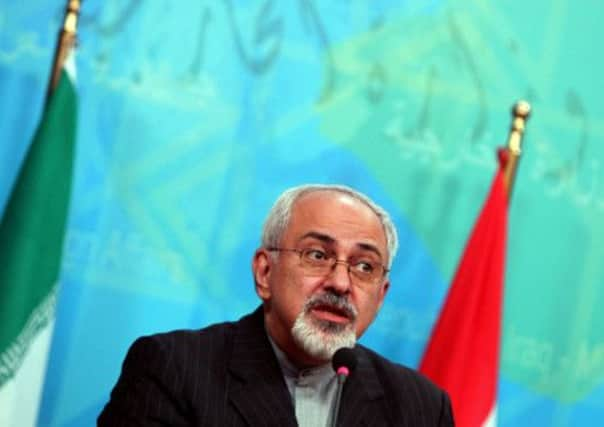Iran: Senior officials join Facebook, Twitter


Iran’s entire 15-member cabinet has opened Facebook pages in recent weeks.
Spearheading the cyber charm offensive has been US-educated foreign minister Mohammad Javad Zarif, who used his new English-language Twitter account last week to wish Jews a happy new year and to proclaim that his country did not deny the Holocaust.
Advertisement
Hide AdAdvertisement
Hide AdA day earlier, president Hassan Rouhani appeared to issue a tweet wishing “all Jews” a “blessed” new year on the holiday of Rosh Hashanah.
Yesterday, Supreme Leader Ayatollah Ali Khamenei put on his Facebook page unexpected praise for French novelist Victor Hugo’s most famous work. “Les Miserables is a miracle in the world of novel writing, in the world of book writing; it is really a miracle … I recommend all young people to read it once,” he wrote, in comments translated into English.
Ayatollah Khamenei’s love of western literature is known, but he has not previously aired his views to a global audience.
Iran’s public diplomacy drive is preparing the ground for key events. Tehran is due in coming weeks to resume high-stakes talks on its nuclear programme with six world powers, including the United States. Mr Rouhani, who is regarded as a moderate pragmatist, has transferred the handling of those negotiations to Mr Zarif’s foreign ministry, taking the portfolio away from hardline security officials.
And later this month, Mr Rouhani will make his debut on the international stage when he addresses the United Nations General Assembly in New York.
The Jewish new year greetings were clearly aimed at distancing his administration from that of his pugnacious predecessor, Mahmoud Ahmadinejad, whose reckless denials of the Holocaust made him toxic to western public opinion, tarnished Iran’s image abroad, fuelled fears over Tehran’s nuclear ambitions, and embarrassed many Iranians.
“The Rouhani team is eager to quickly undo the eight years of damage that the Ahmadinejad government did to Iran’s standing and image,” Trita Parsi, president of the National Iranian American Council lobby group, said. “In this new age, you can at times reach more people through a tweet than through a press release, and Rouhani and Zarif have shown that they know that.”
On his Facebook page, which has 150,000 “likes”, Mr Zarif has also nudged Iran’s public stance on ally Syria in a more moderate direction. He condemned the use of chemical weapons by any side in the civil war while urging the US not to attack Syria.
Advertisement
Hide AdAdvertisement
Hide AdThe new year messages received wide and mostly positive coverage in leading US media. CNN’s Christiane Amanpour tweeted enthusiastically last Thursday that she had just spoken to Mr Zarif who confirmed “that he IS tweeting and wishes Jews in Iran & around the world a happy new year! – Ditto!”
Mr Zarif reinforced those messages in a polite and lively Twitter exchange with Christine Pelosi, daughter of Nancy Pelosi, the Democratic minority leader of the US House of Representatives. Their friendly interaction in cyberspace was remarkable given Tehran has not had diplomatic relations with Washington for more than three decades.
But Suzanne Maloney, an Iran expert at the Saban Centre at the Brookings Institution in Washington, said: “Iran’s Islamic Republic has managed to maintain the largest population of Jews in the Middle East living outside the state of Israel, and its leadership has been known to issue munificent statements toward the community on a semi-regular basis, although perhaps never quite so charmingly as the Twitter pronouncements.”
Nearly all the candidates in Iran’s presidential election in June, hardliners included, used social media as campaign tools.
Facebook and Twitter are the most popular social networking sites in Iran, but the regime blocks or filters them. However, millions of tech-savvy Iranians flout the ban by using anti-filtering tools and proxy servers.
Chinese threaten internet users with three years in jail for ‘spreading online rumours’
China has unveiled tough measures to stop the spread of what the government calls irresponsible rumours, threatening people with three years in jail if untrue posts online are widely reposted.
Beijing is in the middle of yet another crackdown on what it terms “online rumours”, as the government tries to rein in social media, increasingly used by Chinese people to discuss politics, despite strict censorship.
Advertisement
Hide AdAdvertisement
Hide AdAccording to a judicial interpretation issued by China’s top court and prosecutor, people will be charged with defamation if online rumours they create are visited by 5,000 internet users or reposted more than 500 times.
“People have been hurt and reaction in society has been strong, demanding with one voice serious punishment by the law for criminal activities like using the internet to spread rumours and defame people,” court spokesman Sun Jungong said. “No country would consider the slander of other people as ‘freedom of speech’.”
But users of China’s popular Sina Weibo microblogging site expressed anger at the new rules. “It’s far too easy for something to be reposted 500 times or get 5,000 views. Who is going to dare say anything now?” one user wrote.
“This is robbing people of their freedom of speech,” wrote another.
State media have reported dozens of detentions in recent weeks as the government pushes a crackdown on the spreading of “rumours”.